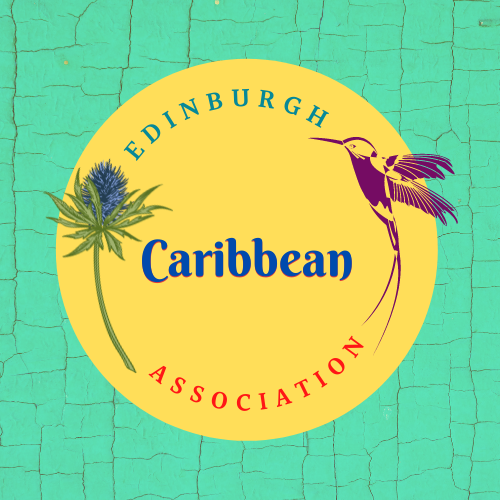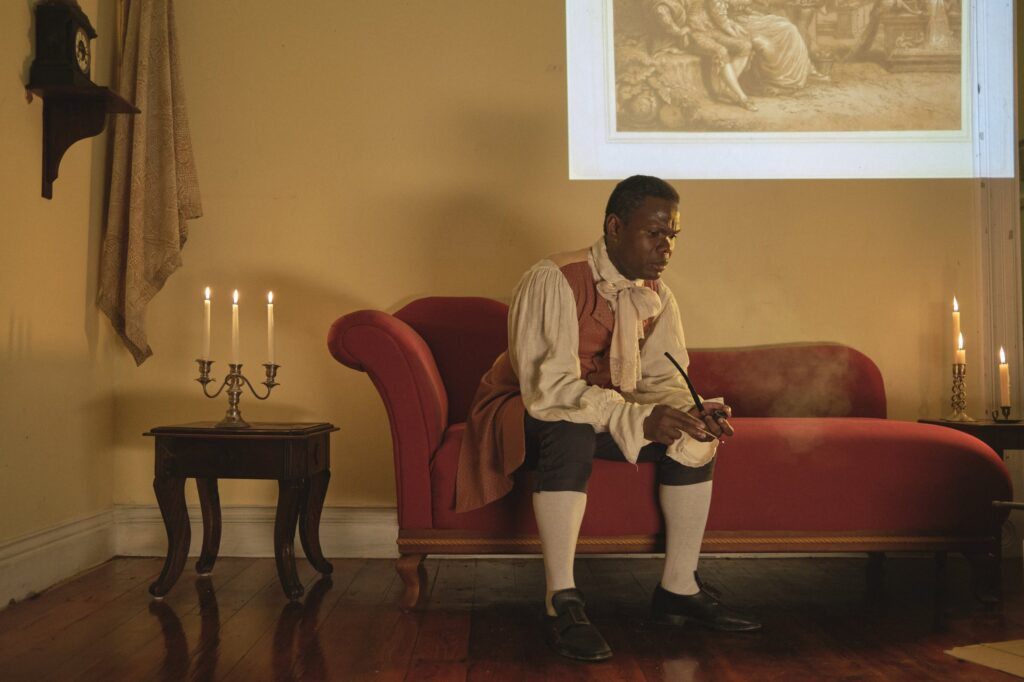
Palimpsest exhibition
Palimpsest, is a powerful new body of work by Grenadian-born, New York-based artist and filmmaker Billy Gérard Frank.
3rd May to 31st October
Paxton House
Berwick-upon-Tweed
TD15 1SZ
The new exhibition at Paxton House explores the deep-rooted connections between Scotland, Grenada, and England, confronting the legacies of the transatlantic slave trade through multimedia art, community storytelling, and education. Building on Frank’s Venice Biennale work, Palimpsest reimagines hidden histories and gives voice to those long overlooked. The exhibition forms the centrepiece of a wider programme which brings together young people from across the UK and Grenada in a creative cross-cultural dialogue.
Related Events
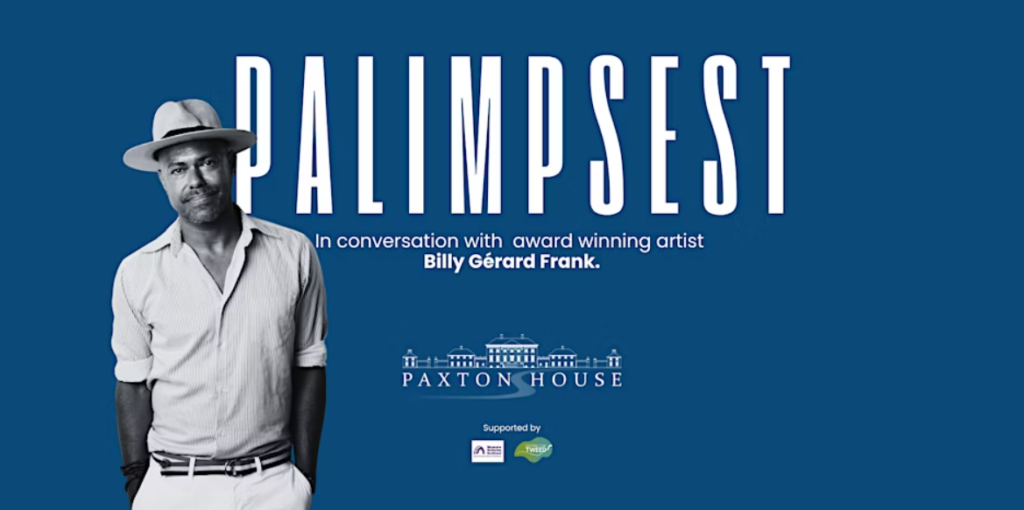
3rd May 2025, 13:45 | Free
Artist Billy Gérard Frank, In Conversation
An intimate afternoon with artist Billy Gérard Frank, sharing the personal stories and creative process behind Palimpsest. Panellists include Lucy Askew, Chief Curator of Modern and Contemporary Art at the National Galleries of Scotland. Lauren Beck, Oscar-nomiated film producer, Lisa Williams, Founder of Edinburgh Caribbean Association, and the panel is chaired by Dr Peggy Brunache, Director of the Beniba Centre for Slavery Studies at the University of Glasgow.
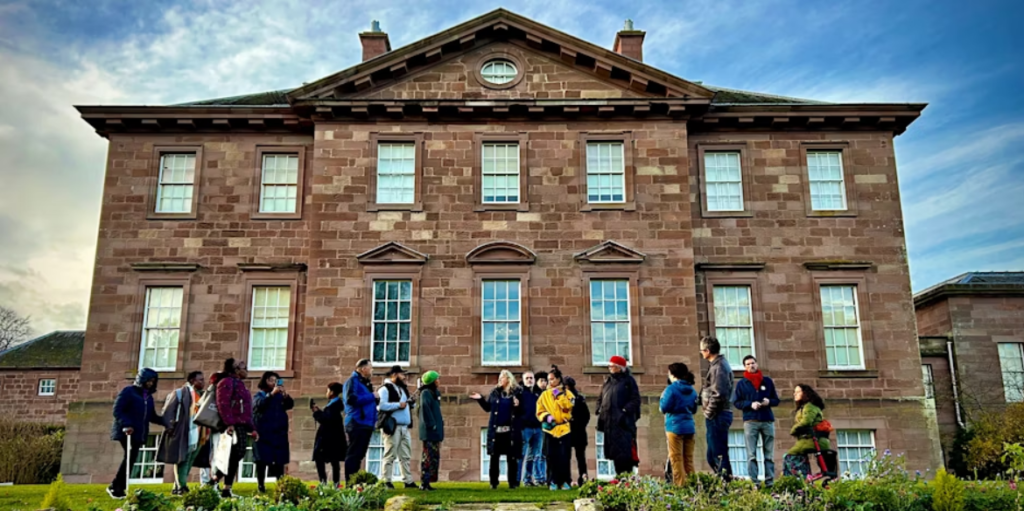
May – October 2025 | Free
Caribbean Connections tour of Paxton House & Billy Gérard Frank exhibition
Paxton’s expert guides will focus upon the historic and contemporary Caribbean connections during this tour of Paxton House. Find out about individuals connected to Paxton’s past and present through art, film, food, furniture, and archives. Plus, a visit to Billy Gérard Frank’s thought-provoking Palimpsest exhibition in the Hayloft.
Dates:
16th & 24th May
13th June
5th & 20th July
2nd & 22nd August
12th & 20th September
4th & 25th October
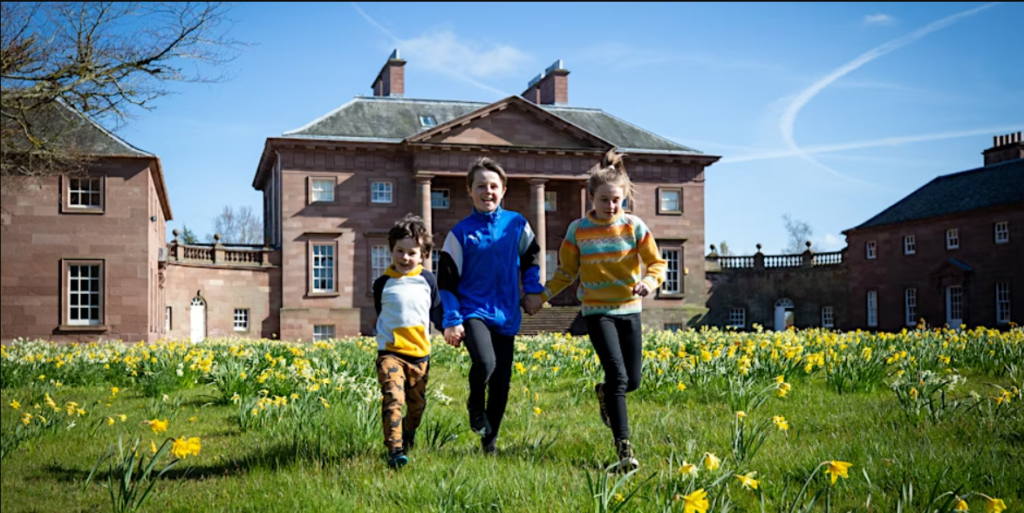
May – October 2025, 10:15am | £10
African and Caribbean crafts kids workshops
Join us for African and Caribbean crafts exploring colour, shape, design, and stories and create your own special work of art to take home.
Dates:
18th & 26th May, 1:30pm
15th & 29th July, 10:30am
1st August, 10:30am
16th October, 10:30am
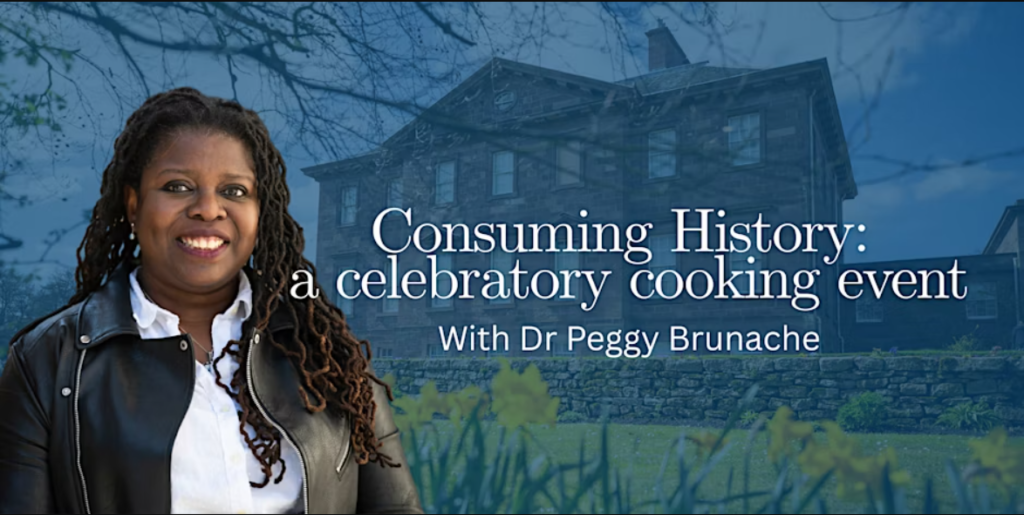
2nd August 2025, 1:15pm | £5
Consuming History: a celebratory cooking event with Dr Peggy Brunache
Academic and food historian Dr Peggy Brunache leads a celebratory cooking event that charts the evolution of ‘slave cuisine’ to Creole cuisines and discusses what can be learned about the lives of enslaved people in the Caribbean as joy, pride, resilience, and resistance through the food they cooked and still enjoyed by their descendants today. Audiences will also have an opportunity to taste the food created at the event.
Dr Peggy Brunache is a lecturer in Public History and Archaeology at the University of Glasgow and serves as the founding Director of the Beniba Centre for Slavery Studies, Scotland’s first for supporting and sharing research on slavery, legacies, and leading international and national reparative justice initiatives.
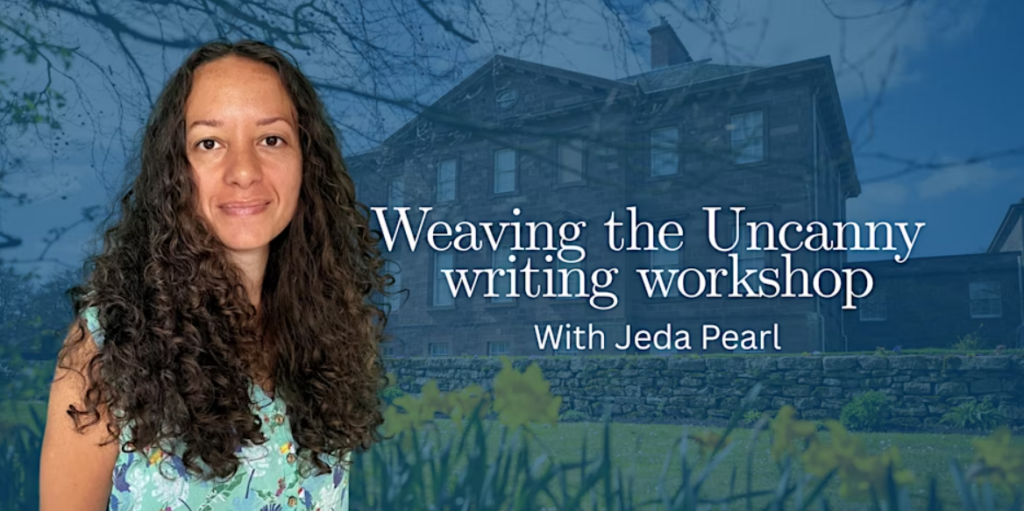
29th August 2025, 1:30pm | £20
Weaving the Uncanny writing workshop with Jeda Pearl
Join Scottish Jamaican poet and fiction author Jeda Pearl to explore Paxton House’s history and grounds, links with the Caribbean, and create pieces of writing braided with folklore and supernatural elements. This workshop is geared towards adults and young people (14yrs+). Beginners and experienced writers all welcome.
Visiting Palimpsest and Caribbean Connections exhibitions (both free) beforehand is encouraged.
Please dress for the weather.
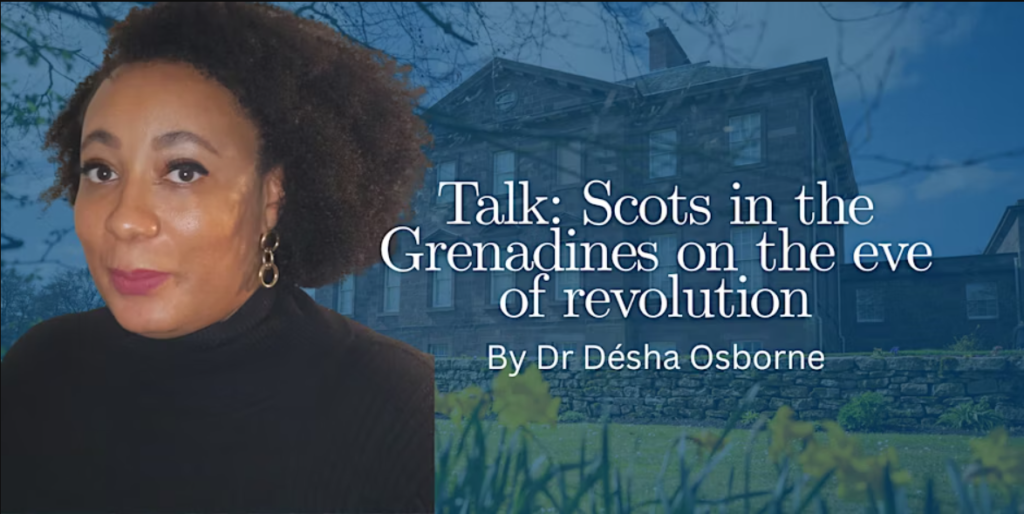
4th October 2025, 1:30pm | Free
Scots in the Grenadines on the eve of revolution with Dr Désha Osborne
Exploring the presence of the Campbell family, their associates and the Caribbean people whose lives were forever changed in the Grenadine islands during the final decades of the eighteenth century.
Dr Désha Amelia Osborne is a Chancellor’s Fellow Lecturer in English Literature at the University of Edinburgh. The daughter of Vincentian immigrants, she is a scholar of Caribbean and transatlantic literary history, and her teaching and research are focused on colonialism, slavery, and the migrations of people, culture, and ideas.
Désha is currently completing a monograph study of Scottish settlers and enslavers in the island of St Vincent during the 18th and early 19th century who were collectively responsible for reconstructing the landscape, culture and historical imagination of the island during this period. The research also works to uncover the lives of Black and mixed-heritage women and their children enslaved by these Scots.
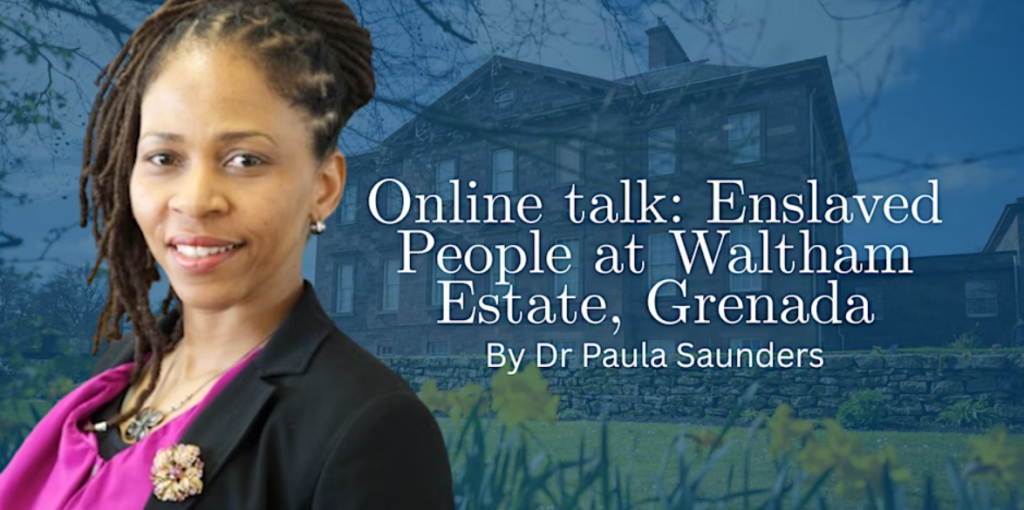
9th October 2025, 1:00pm | Free
Online talk: Enslaved People at Waltham Estate with Dr Paula Saunders
This online Lunchtime Lecture with Dr Paula Saunders, City University of New York, will explore the lives of enslaved Africans at Waltham estate during slavery. Who were they, what do we know about them, and what was life like for them at Waltham? While we may have limited information on the generations of African-descended people who were forcibly enslaved at Waltham, there is a fair amount of information about them during the last five decades of slavery.
Using a timeline model, this paper will discuss the number of enslaved people at Waltham over time, possible relationships between individuals, their working conditions, diseases and mortality, as well as how events in the Atlantic world impacted their lives.
It will also explore the ways in which these enslaved people resisted their enslavement, including their participation in Fedon’s Rebellion in 1795-1796. In this the first year that Grenada commemorates emancipation from enslavement on August 1st, it is fitting that we remember these forgotten people who not only endured exploitation and violence on plantations across the island, but we should also celebrate their creativity in developing a unique Grenadian culture on the same plantations on which they were confined.
